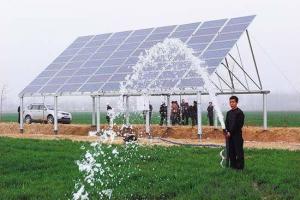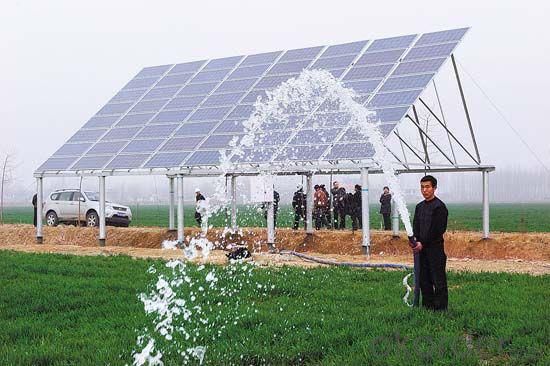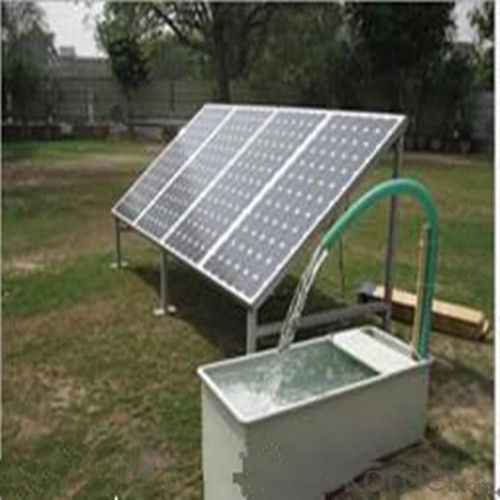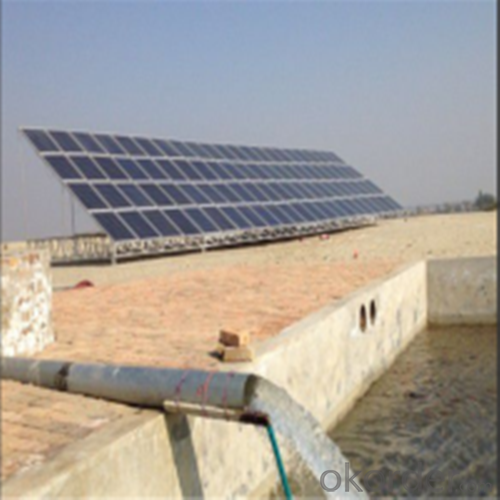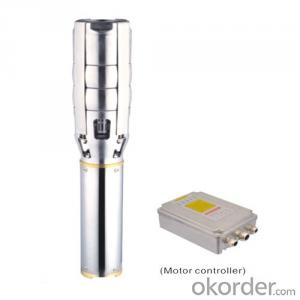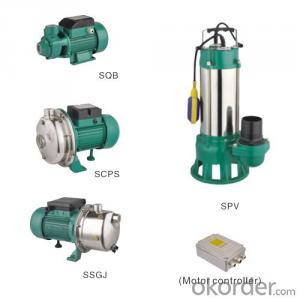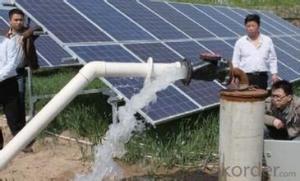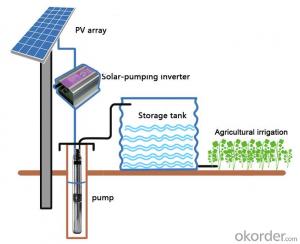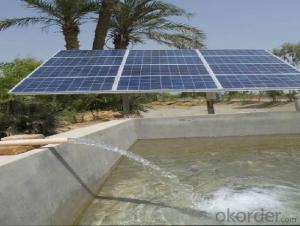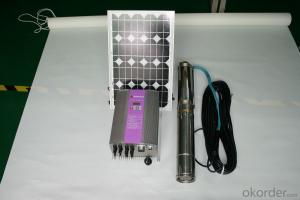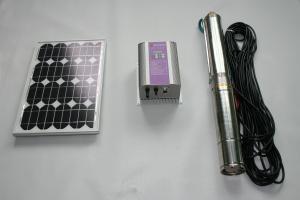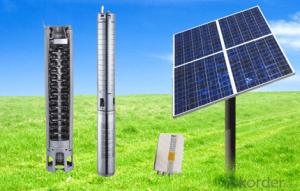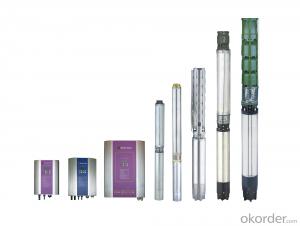Fountain Solar Pump Kit:Solar Powered Water Pump System for Irrigation with Low Price
- Loading Port:
- Shanghai
- Payment Terms:
- TT OR LC
- Min Order Qty:
- 1 set
- Supply Capability:
- 1000 set/month
OKorder Service Pledge
OKorder Financial Service
You Might Also Like
Solar Powered Water Pump System For Irrigation With Low Price
DC solar water pumping system consists of the motor, pump, controller, solar array and some other accessories, such as water level sensor, float switch, etc. Considered that storing water is more efficient than storing electricity, the system is designed to directly drive the pump without battery which can reduce the construction and operating cost and routine maintenance effectively.The PV array consists of multiple solar panels connected in series/parallel, which can supply the whole system as power source by converting the absorbed solar radiation energy to the electrical energy. The pump driven by a brushless DC permanent magnet motor draws water from deep-well or river. The pumped water is then fed into reservoir or water tank, or connected to the irrigation system or fountain system directly.
Advanced Technology
Applications Innovation
The efficiency of DC brushless permanent magnet motor has been increased up to 25% in comparison with traditional asynchronous motor.
Technology Innovation
Stator and rotor are sealed by environment friendly casting resin.Motor insulation resistance can be hold higher than 300MΩfor more than 10 years, which consumedly increased the security and reliability of the submersible motor.
Structure Innovation
Casting resign technology processed stator and rotor as well as the water lubricated bearing make the submersible pump environment friendly.
Feature
High Efficiency & High Reliability
DC Brushless Permanent Magnet Motor
Minimum Maintenance, long Service Life
Environment Friendly Materials, Lubricated Without Oil
Application
Village or Family Water Supply
Animal Drinking Water & Livestock Watering
Garden/Courtyard Irrigation
Swimming Pool
Water Supply for Bivouac or Camping Car
Water Supply for Remote Area
Automatic Control
Operate Automatically, No Need Watching
Maximum Power Point Tracking (MPPT)
Dry-run Protection
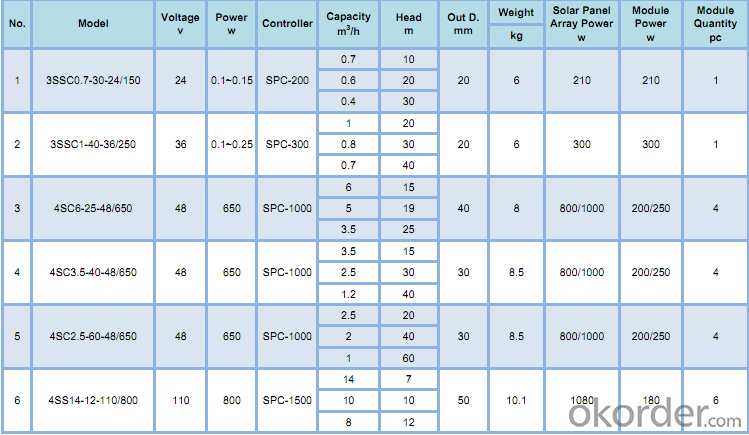
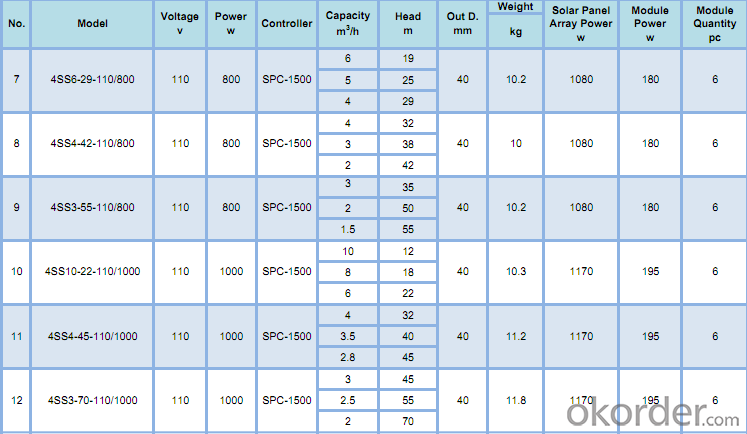
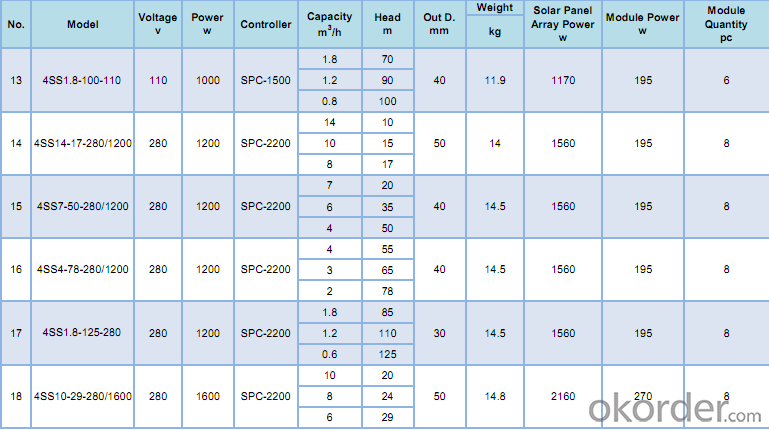
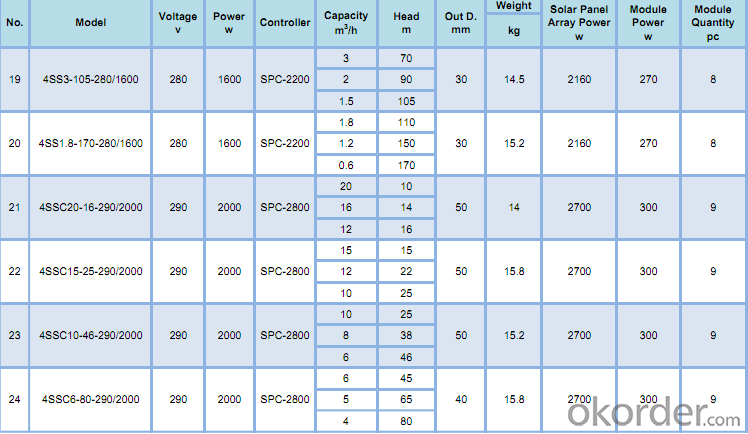
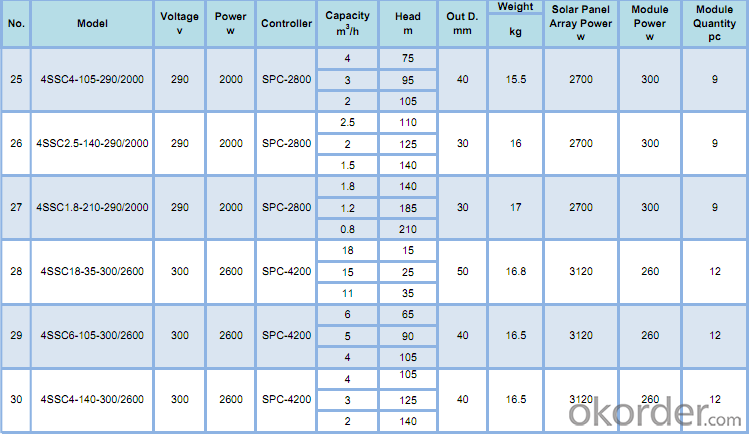
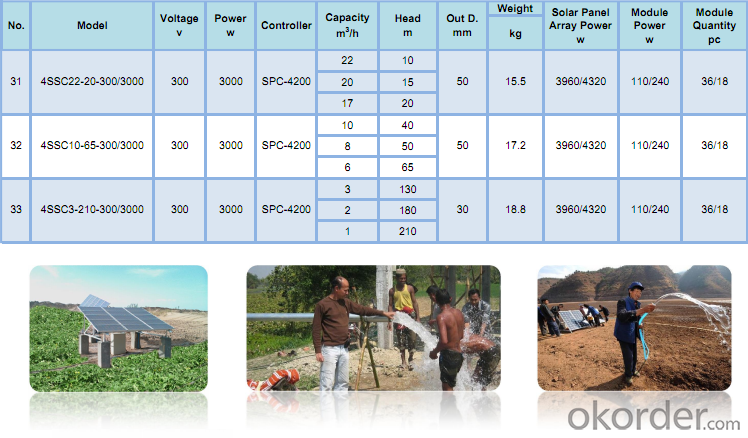
- Q: Are there any risks of over-pumping with a solar pump?
- There are indeed risks associated with the use of a solar pump that extracts water at a rate faster than it can naturally replenish itself. One of the primary dangers is the depletion of the water source, particularly in regions with scarce water resources. This depletion can lead to a scarcity of water, decreased levels of groundwater, and even the complete drying up of wells or boreholes. Furthermore, over-pumping can have a significant impact on the local ecosystem and biodiversity. It can result in the drying up of important habitats such as wetlands, streams, or rivers, which serve as vital environments for various plant and animal species. This disruption can upset the natural balance and have adverse effects on local flora and fauna. Another risk involves the sinking or collapse of land, particularly in areas where groundwater levels are high. When water is excessively extracted, the ground can subside or give way, causing structural damage to buildings, infrastructure, and even the formation of sinkholes. Moreover, over-pumping can compromise the quality of water. As water levels decrease, the concentration of pollutants and contaminants in the remaining water can rise. This can render the water unsafe for consumption or irrigation. To address these risks, it is crucial to appropriately size and design solar pumping systems, taking into consideration the available water resources, local regulations, and the specific needs and limitations of the area. Additionally, implementing monitoring systems and establishing suitable controls can help prevent over-pumping and ensure the sustainable management of water.
- Q: How does a solar pump handle freezing temperatures?
- A solar pump typically handles freezing temperatures by utilizing a built-in freeze protection system. This system prevents the pump from freezing and getting damaged by automatically draining the water from the pump and associated pipes when temperatures drop below a certain threshold. This ensures that no water is left inside the pump or pipes, eliminating the risk of freezing and potential damage.
- Q: What is the maximum depth a solar pump can pump water from?
- The maximum depth that a solar pump can effectively pump water from depends on various factors such as the power of the solar panel, the efficiency of the pump, and the specific conditions of the water source. However, in general, solar pumps can typically pump water from depths ranging between 30 to 100 meters.
- Q: How does a solar pump handle sediment in the water?
- A solar pump typically uses a filter or strainer to prevent sediment from entering the system. This helps to protect the pump and other components from damage and ensures the water remains clean and free from debris.
- Q: Is a solar pump easy to install?
- Yes, a solar pump is generally easy to install. It does not require complicated wiring or extensive plumbing work. The installation process involves mounting the solar panel and connecting it to the pump using simple connectors. Additionally, there is no need for an external power source, making it a convenient and hassle-free installation.
- Q: How does a solar pump handle water with high levels of turbidity or suspended solids?
- A solar pump is typically not designed to handle water with high levels of turbidity or suspended solids. These pumps are more suitable for clean water sources as the presence of turbidity or suspended solids can clog the pump, reducing its efficiency and potentially causing damage. In such cases, pre-treatment methods like settling tanks or filters may be required to remove the solids before the water is pumped.
- Q: What is the difference between centrifugal pumps and circulating pumps?
- Under normal circumstances, the circulating pump head is low, up to 2 meters, while the flow is large, up to thousands of cubic meters / hour.
- Q: Are there any limitations on the temperature range that solar pumps can operate in?
- Yes, there are limitations on the temperature range that solar pumps can operate in. Solar pumps are designed to work in specific temperature ranges, typically between -40°C to 60°C (-40°F to 140°F). Extreme temperatures outside of this range can negatively impact the performance and efficiency of solar pumps.
- Q: Can solar pumps be used for water supply in remote research stations or observatories?
- Yes, solar pumps can be used for water supply in remote research stations or observatories. Solar pumps are an ideal solution for remote locations as they are not dependent on grid electricity and can operate using solar energy. They provide a sustainable and reliable source of water supply, making them suitable for remote areas where access to electricity may be limited. Additionally, solar pumps require minimal maintenance and have a long lifespan, making them a cost-effective and efficient option for water supply in remote research stations or observatories.
- Q: Can a solar pump be used for artificial waterfalls?
- Yes, a solar pump can be used for artificial waterfalls. Solar pumps are a sustainable and eco-friendly option for powering water features, including artificial waterfalls. They use solar energy to generate power, eliminating the need for electricity or batteries. Solar pumps are efficient and can provide sufficient water flow and pressure to create a beautiful and captivating waterfall effect.
Send your message to us
Fountain Solar Pump Kit:Solar Powered Water Pump System for Irrigation with Low Price
- Loading Port:
- Shanghai
- Payment Terms:
- TT OR LC
- Min Order Qty:
- 1 set
- Supply Capability:
- 1000 set/month
OKorder Service Pledge
OKorder Financial Service
Similar products
Hot products
Hot Searches
Related keywords
